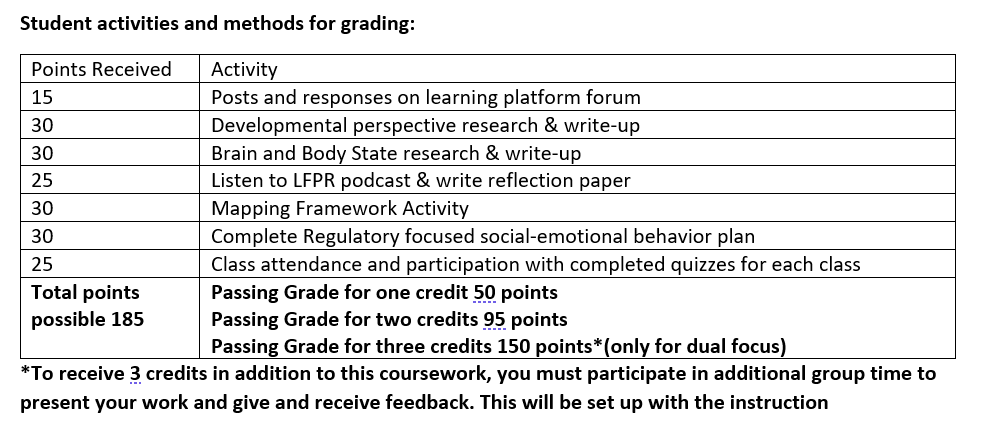Evolution of a Synergetic Educator Assignments
Certificate of Completion Requirements:
Watch all 10 classes, 4 of which are live webinars (attendance is strongly recommended, however they are recorded) and take all associated quizzes, which can be re-taken
If you are unable to attend any of the consultation groups live, you have the option of turning in questions that we will discuss, as each session is recorded, however you will not receive hours on your certificate for group sessions unless you attend live or you watch the recording and turn in notes.
Credit Requirements: To register for CSU credit see links below
The course can be taken for ONE, TWO or THREE credits.
Cost: $65 paid to CSU for each credit along with CSU registration
Watch all 10 classes, 4 of which are live webinars (attendance is strongly recommended, however they are recorded) and take all associated quizzes, which can be re-taken
If you are unable to attend any of the consultation groups live, you have the option of turning in questions that we will discuss, as each session is recorded, these hours count as contact time for graduate credit so if you do not attend live you must watch the recording and turn in notes.
To receive credit, you must complete the following assignments outside of class time:
Textbooks:
For educators: School and Classroom Perspectives
- Desautels, Lori (2020) Connections Over Compliance: Rewiring Our Perceptions of Discipline.
For school-based mental health professionals: Mental health Perspective
- Dion, Lisa (2018). Aggression in Play Therapy: A Neurobiological Approach for Integrating Intensity.
General Assignment Overview: (For information on specific assignments scroll down page)
- Section 1 post on forum.
- Brain and Body State research & write up
- Developmental perspective research & write up – DUAL FOCUS ONLY
- Listen to the 20 minute podcast called “How Trying to be Calm Gets in the Way of Regulation” and write a one page reflection paper.
- Section 2 post on forum.
- Section 3 post of forum.
- Analyze an interaction using the Mapping Framework
- Complete a regulatory focused social-emotional behavior plan.
The course is Pass/Fail
Student activities and methods for grading:

To receive credit you must register with CSU, and pay their $65 per credit hour fee. You can do so by clicking on the two following documents: You must register with CSU by April 1st, 2025 to be eligible for credit and once registered you cannot drop the course nor receive a refund from CSU.
Please read the General registration document and the cohort specific document below to register for CSU credit by 4/1/25 deadline:
General Registration Information for all
Registration for Student-Focused Cohort – THIS DOCUMENT WILL BE AVAILABLE January 2025
Registration for Dual-Focused Cohort – THIS DOCUMENT WILL BE AVAILABLE January 2025
Specific Assignments and Materials
To turn in assignments, please upload to your goggle drive folder. The link is provided by your instructor.
To help keep you on track please use this HOMEWORK CHECKLIST WORKSHEET, and turn it in with your final assignment.
SECTION 1:
Assignments
- Post: As you have looked at your own, and others’ behaviors through a brain state and stress response lens, what have you noticed? How has using this lens impacted your thinking and/or behaviors? Post Due 2/24/25
- Brain and Body State research & write up Paper Due 3/10/25
- Developmental perspective research & write up Paper Due 3/24/25
Materials
- Research and Write-Up Assignment Instructions
- Developmental Perspective Template
- Brain and Body State Template
SECTION 2:
Assignments
- Listen to the 20-minute podcast called “How Trying to be Calm Gets in the Way of Regulation” and write a one page reflection paper. Due 3/31/25
- Posts: As you think about using the concepts of Braindrops, Learning Tools and somatosensory regulation, what challenges and benefits do you perceive Understanding that co-regulation starts with us, also has challenges and benefits. What do you see as the biggest challenges, and what are your thoughts for addressing them? Due 4/7/25
Materials
- Lessons From the Playroom Podcast Reflection Paper Instructions
- Lessons From the Playroom Podcast #118: How Trying to be Calm Gets in the Way of Regulation
SECTION 3:
Assignments
- Analyze an interaction using the mapping framework to better understand what might have caused escalation and alternative ways to approach the dynamic. Due 4/21/25
- Post: Understanding that relationship dynamics are complicated and based on past associations and patterns can help us recognize that how a student is behaving is “not about us.” How does seeing behavior and dynamics through this lens impact your own thinking and behavior? Due 4/28/25
- Complete a regulatory focused social-emotional behavior plan. Instructions and forms are below. Please have a specific student in mind and create a plan that you will be able to implement. Layered Social-Emotional Behavior Plans will be discussed in our final two classes. Due 5/5/25
Materials

